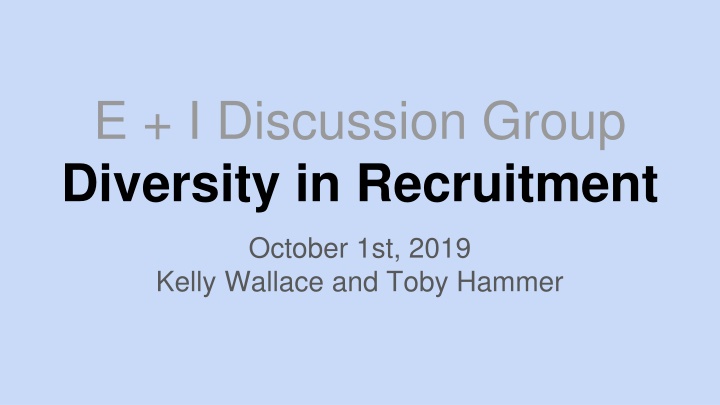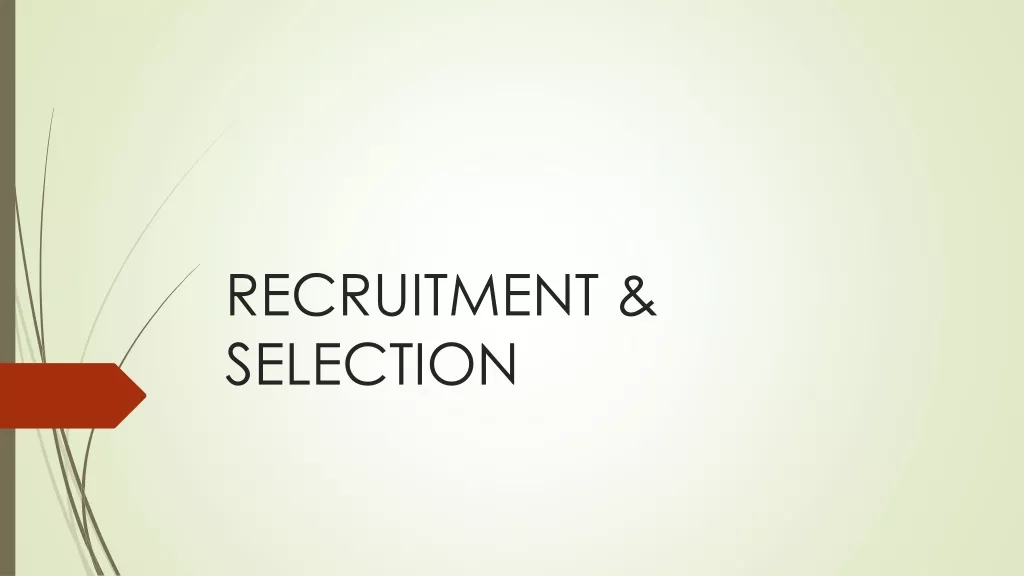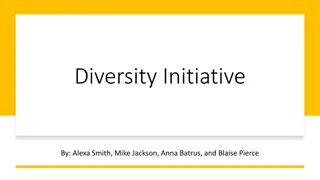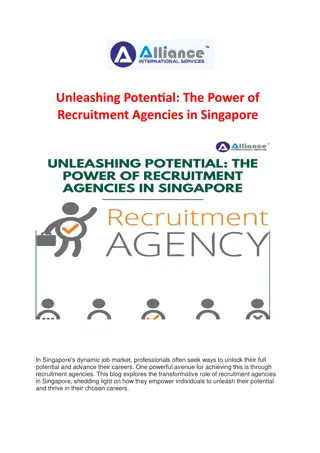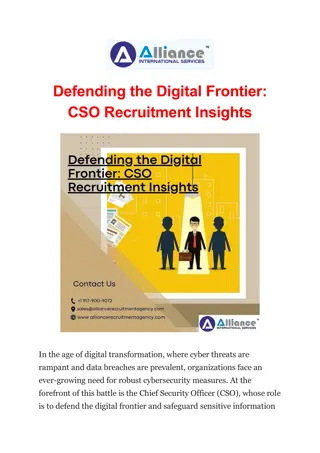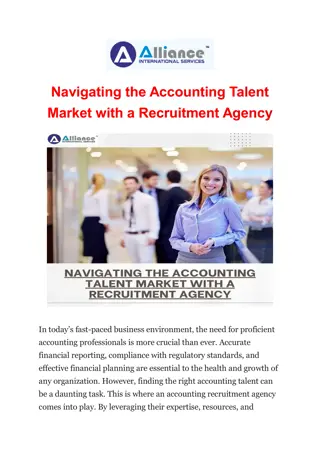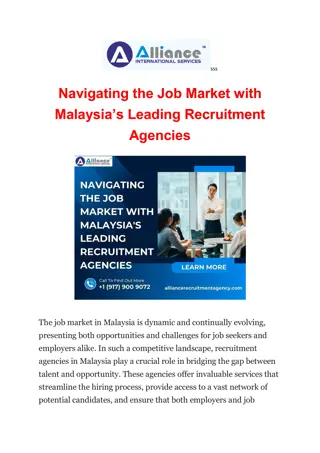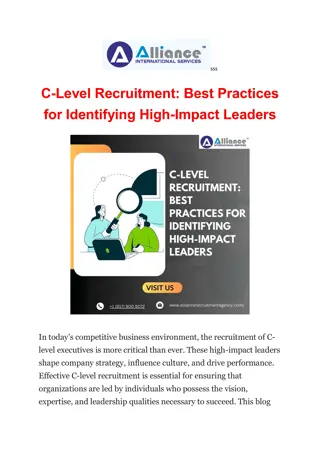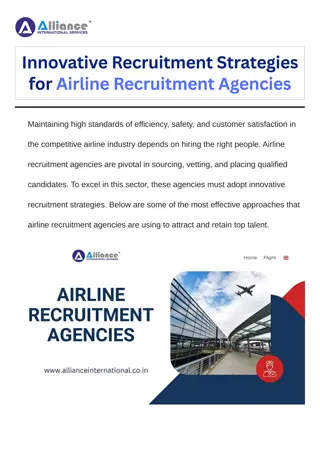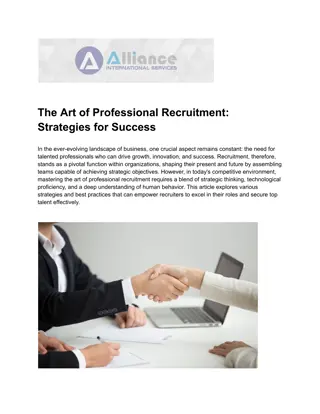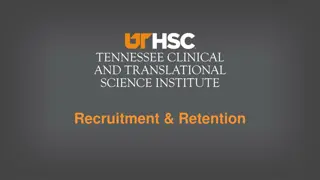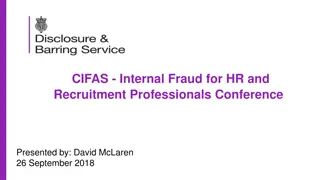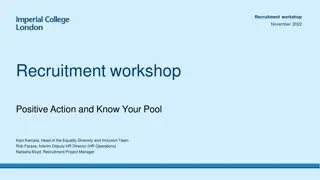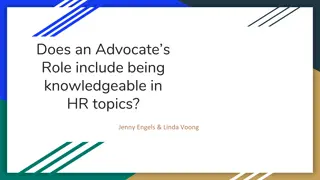Best Practices for Diversity in Recruitment Discussions
Discussion group held on October 1st, 2019, focusing on actionable steps to enhance diversity in recruitment processes. The session addressed attracting diverse candidates, forming inclusive committees, refining selection processes, and eliminating biases in interviews. Insights shared around positive/negative recruitment experiences and UT IB's efforts for equitable recruitment. Additional resources highlighted enhancing recruitment practices for equity, diversity, and inclusion.
Download Presentation

Please find below an Image/Link to download the presentation.
The content on the website is provided AS IS for your information and personal use only. It may not be sold, licensed, or shared on other websites without obtaining consent from the author.If you encounter any issues during the download, it is possible that the publisher has removed the file from their server.
You are allowed to download the files provided on this website for personal or commercial use, subject to the condition that they are used lawfully. All files are the property of their respective owners.
The content on the website is provided AS IS for your information and personal use only. It may not be sold, licensed, or shared on other websites without obtaining consent from the author.
E N D
Presentation Transcript
E + I Discussion Group Diversity in Recruitment October 1st, 2019 Kelly Wallace and Toby Hammer
Outline Part 1. Open Forum Part 2. Actionable Steps for Recruitment 1. Attract diverse candidates 2. Prepare a diverse search/admissions committee 3. Be intentional about the early selection process 4. Structure the in-person interview process to not discourage certain individuals Part 3. Revisit the Open Forum
Open Forum 1. What positive or negative experiences have you experienced or observed in recruitment (grad, postdoc, or faculty level)? 1. What specific practices, policies, and efforts does UT IB already employ to ensure equitable and diverse recruitment?
ATTRACT PREPARE SELECT INTERVIEW UT Faculty Recruitment Data provided by Marian Schmidt & Julia York
Actionable steps for recruitment: how do we improve? Equity, Diversity and Inclusion: A Best Practices Guide for Recruitment, Hiring and Retention - Canada Research Chairs http://www.chairs-chaires.gc.ca/program-programme/equity-equite/best_practices-pratiques_examplaires-eng.aspx
ATTRACT PREPARE SELECT INTERVIEW Guideline for best recruitment practices 1. Attract diverse candidates 2. Prepare a diverse search/admissions committee 3. Be intentional about the early selection process 4. Structure the in-person interview process to not discourage certain individuals
ATTRACT PREPARE SELECT INTERVIEW Article Breakout How the opaque way we hire postdocs contributes to science s diversity problem - Terry McGlynn
ATTRACT PREPARE SELECT INTERVIEW Attract Diverse Candidates Be active, and consider who are you reaching out to... Post the listings on multiple forms of social media and diversity-focused email lists DiversifyEEB, 500 Women Scientists Reach out to programs that provide research opportunities to minorities SUPER program (CMB), McNair Scholars, ABS Turner Program PUI- Primarily Undergraduate Institution MSI - Minority Serving Institution HBCU - Historically Black Colleges & Universities
ATTRACT PREPARE SELECT INTERVIEW Attract Diverse Candidates In the application/solicitation: Use gender neutral pronouns Don t harp on the word qualified (especially don t use it as a diversity caveat ) Require, as part of the job criteria, a track record related to diversity and inclusion. Highlight that career interruptions due to parental leave, family care, extended illness, or community responsibilities should not negatively impact the assessment of a candidate s research productivity. It is important that applicants know these will be taken into consideration when candidates are assessed. (CRC)
ATTRACT PREPARE SELECT INTERVIEW Prepare a Diverse Committee Rule of >1 (have more than one minority committee member) If you identify as a member of the majority take responsibility to learn independently about the experiences, perspectives and contributions from non- dominant perspectives (ideally through reading and experience rather than through personal conversations which also require time and energy) and to champion those points of view. (CRC) Minimize risk associated with participation.
ATTRACT PREPARE SELECT INTERVIEW Prepare a Diverse Committee Attend to group dynamics. Repeat and emphasize the opinions and ideas of minorities in the committee. Suspend disbelief. Marginalized viewpoints can often be hard to hear or understand for people who have not been exposed to particular perspectives before. They often are not taken at face value, but are justified and explained away. (CRC) Spend some time as a committee researching topics like unconscious bias, and perhaps take one or two implicit association tests beforehand (https://implicit.harvard.edu/implicit/takeatest.html)
ATTRACT PREPARE SELECT INTERVIEW Be intentional about the early selection process Become familiar with minority-based fellowships and opportunities. If the pool of applicants to the posting is not large or diverse enough, extend the application deadline, or review the ad more critically for potential barriers and repost it.
ATTRACT PREPARE SELECT INTERVIEW Be intentional about the early selection process Acknowledge that letters of recommendation are biased 16% longer for male trainees. Research has shown that assessors are more likely to use grindstone adjectives (e.g., hardworking, diligent, conscientious ) to describe women, and to reference these candidates personal lives, while they are more likely to use stand-out adjectives (e.g., outstanding, superb, excellent ) to describe men, and to reference their CV, publications or patents. (CRC)
ATTRACT PREPARE SELECT INTERVIEW Be intentional about the early selection process Don t focus solely on a strong publication record, to the exclusion of other aspects, including non-traditional areas of research and/or research outputs. Critically evaluate if a candidate s standardized test scores, grades, etc. are likely to accurately predict their ability to succeed in grad school (e.g. GPA, SAT, GRE)
ATTRACT PREPARE SELECT INTERVIEW The GRE as one potential barrier to inclusive grad student recruitment - Test taking and prep is a significant barrier for students with less time and fewer resources Evidence that GRE scores actually predict success in grad school is mixed and controversial GRE scores often biased in favor of white males from wealthier socioeconomic backgrounds (e.g., Miller & Stassun, Nature 2014) >250 grad programs have dropped the GRE; e.g. ecology/evolution/IB/Biology departments at U Chicago, Yale, Berkeley, Harvard, U Michigan, U Penn, UW, UCLA, U Oregon, U Colorado, Princeton, Wash U, etc. At the least, many people (including ETS) recommend against using poor GRE scores to quickly filter out applicants - - - -
ATTRACT PREPARE SELECT INTERVIEW Article Breakout If there s only one woman in your candidate pool, there s statistically no chance she ll be hired - Prof. Stefanie Johnson, David Hekman, & Elsa Chan
ATTRACT PREPARE SELECT INTERVIEW Structure the in-person interview process to not discourage certain individuals Ensure all candidates receive the same tailoring of visits (speaking with specific people, seeing certain resources, etc) Grad Recruitment alternative events- (EEB Grad Recruitment is early february!) Have plans/resources available for those unable to attend recruitment weekend Have an anonymous exit survey to evaluate grad/faculty interview/visit experience
Open Forum - Action Items for this department What actions or ideas from the previous slides could IB use to improve equity and diversity in recruitment? EEB Graduate Admissions Chair- Misha Matz IB Department Chair - Claus Wilke Faculty Search Chair for Evolutionary Genomics - Bob Jansen
(Optional if time? How retention and promotion efforts affect recruitment efforts) Differences between recruitment and retention; how improving retention in the dept can benefit recruitment Systematically collect self-identification data at all levels of faculty. Ask faculty, staff and students of every background and ability about the institution s collegiality and climate and how well it is doing in its equity, diversity and inclusion work. Put a candidate s teaching evaluations in context.
Why is recruiting diverse students/postdocs/faculty important? Because there are always many ways in which a particular topic can be viewed, diverse perspectives are needed to gain comprehensive understanding. Bias reduces our ability to hear and learn from new-to-us perspectives diversity does NOT sacrifice quality or merit good grief people Representation
Why is recruiting diverse students/postdocs/faculty important? Are there members of underrepresented groups in senior leadership and research roles in our organization? How have role models influenced you? Are there members of underrepresented groups acting as mentors for faculty and students? How does your organization recognize E&I efforts and achievements? When in a recruitment process are marginalized views most needed?
Common biases in recruitment Remember the rule of >1. Suspend disbelief. Marginalized viewpoints can often be hard to hear or understand for people who have not been exposed to particular perspectives before. They often are not taken at face value, but are justified and explained away.
Reading/stats Johnson et al. Harvard Business Review? (https://www.researchgate.net/profile/David_Hekman3/publication/303003812_If_ There's_Only_One_Woman_in_Your_Candidate_Pool_There's_Statistically_No_ Chance_She'll_Be_Hired/links/575eea9908ae9a9c955f8e2c/If-Theres-Only-One- Woman-in-Your-Candidate-Pool-Theres-Statistically-No-Chance-Shell-Be- Hired.pdf) Postdoc recruitment article
